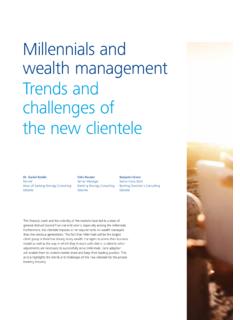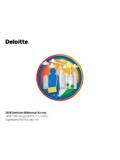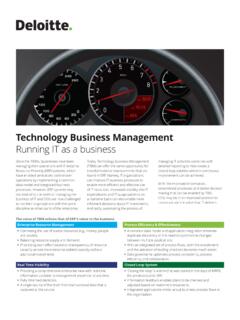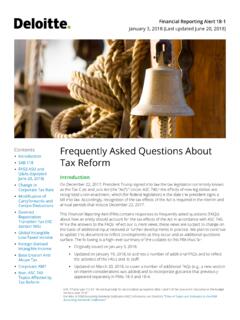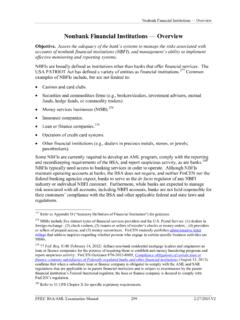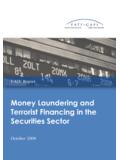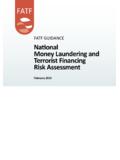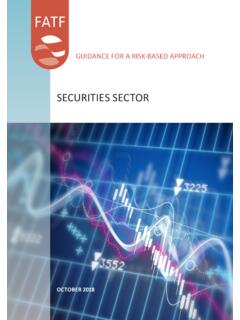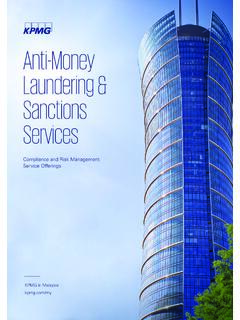Transcription of fraud response management - Deloitte
1 fraud response management : Is your organization prepared to execute an efficient and effective response ?Centre for Corporate GovernanceSome organizations have designed and tested disaster plans to help them respond to unforeseen catastrophes that could have the potential to threaten their very existence. These organizations have learned, often times through personal experience, that the time to plan is before catastrophe hits and not after. Yet some of these organizations may not have applied this same thinking to the business risks associated with fraud and, consequently, may not have adequate processes in place to deal with allegations of fraud and misconduct. This risk oversight could be worrisome considering the potentially significant impact of effective fraud response management program is designed to allow the organization to react to various types of fraud and misconduct allegations in a measured and consistent manner.
2 The overarching goal of a fraud response program is to protect the organization from the economic, reputational and legal risks associated with the fraud allegation. Specifically, a fraud response management program may encompass:!the procedures and processes through which an organization is alerted to allegations of potential fraud and misconduct; !the manner in which those allegations are initially and subsequently communicated within the organization; !the assignment of responsibility and accountability for handling those allegations;!decision making authority; !the methods and procedures by which allegations are investigated; !consideration of legal implications, documentation and evidentiary procedures; !
3 Reporting of investigation results within the organization; !remedial recommendations; and, !procedures for dealing with outside parties. These processes, when effectively designed and implemented, can become one of the most critical elements of an organization's anti- fraud program. These steps, however, should be tailored to fit the organization. Failing to implement an effective fraud response management program as part of your organization's overall anti- fraud programs and controls may put your organization at significant risk. fraud happens and will likely continue to plague organizations and world markets for some time. Preparedness is part of the important considerations when designing an effective fraud response management program can include:!
4 Monitoring compliance with applicable legal and regulatory standards; !confirming that the complaint intake system provides for anonymous reporting; !defining roles and responsibilities for those involved in the fraud response management process; !establishing clear and meaningful investigative protocols to include interviewing, evidence collection, computer forensic examinations, and analysis; !identifying competent fraud investigation resources, especially global response teams, in advance of a crisis;!utilizing a case management system that allows the organization to efficiently track and log the progress and resolution of fraud allegations; !establishing consistent reporting within and outside the organization; and, !
5 Identifying processes and control improvements enterprise-wide to help gain efficiencies and prevent recurrences. As organizations expand their global presence, it can be important that they have a well devised fraud response management program in place that allows them to respond appropriately to allegations of fraudand misconduct around the world. This can be especially important in light of the world economic conditions2 2009 Deloitte Touche Tohmatsu India Private LimitedA recent Association of Certified fraud Examiners ( ACFE ) survey suggests that the typical fraud lasts two years from the time it began until the time it was caught by the victim 1 organization1 Source: ACFE 2008 Report to the Nation 3because the risk of fraud can increase in an economic downturn.
6 The economic downturn can also create the added challenge of compelling organizations to be more efficient with their resources, including those utilized for responding to and managing fraud an allegation of fraud surfaces, the organization decides how to proceed and to what extent it may investigate. In some instances, outside counsel is retained to conduct an investigation. Sometimes, organizations may rely on their own internal investigative groups that sit within the internal audit, compliance, legal or security functions to address the allegations. Such efforts, should be well managed as that can aid companies in avoiding duplication of efforts and allow for better coordination in investigating and responding to potential fraud allegations.
7 The investigation process itself can be disruptive to normal business operations and can bring rise to a host of potential legal and regulatory risks that can have consequences beyond actual fraud losses. In India and other countries like , there are a myriad of laws and regulations related to fraud . Some of these are discussed below. With the current global financial crisis and the recent discovery of several significant frauds, it seems logical that new regulations and a renewed focus on fraud response could be forthcoming. Legal and regulatory backgroundFurther, more countries around the world are imposing additional anti- fraud and anti-corruption provisions on United States Sentencing Guidelines ( USSG ) provide specific criteria that include organizational mechanisms for reporting and responding to allegations of fraud .
8 The USSG provide that the culpability score for organizations is generally determined by six factors for consideration by the sentencing court four factors that may increase the ultimate punishment and two that 4may mitigate it. 2009 Deloitte Touche Tohmatsu India Private LimitedThe fact that tips continue to be the most effective means of detecting fraud suggests that organizations could improve their detection efforts by establishing formal structures to receive reports about possible 2fraudulent Source: ACFE 2008 Report to the Nation3 Germany is a prime example of a foreign government imposing responsibility on a nationally based entity to conduct a large internal investigation into allegations of fraud and According to USSG, aggravating factors include: involvement or tolerance of criminal activity; prior history of the organization; violation of an order; and obstruction of justice.
9 Mitigating factors include: existence of an effective compliance and ethics program ( ECEP ); and either self-reporting, cooperation, or acceptance of responsibility. Regulators and judges are increasingly asking not just whether a company has an anti- fraud , anti- money laundering , or corporate ethics policy in place, but they are also asking how well such programs work and whether their quality and results make sense. They are asking, in other words, how good are they? This trend raises the stakes for those charged with governance. A partner from Deloitte Financial Advisory Services LLPF ailure to have a proper fraud response management program might be viewed as tolerating and/or condoning the activity.
10 It is important to note that just having a compliance or ethics program may not be sufficient to result in a reduction of the culpability score. The USSG expressly provides that an organization will not be eligible to receive a favorable adjustment for having an effective compliance and ethics program if the organization delays reporting an offense and/or if individuals within certain levels of the organization participated in, condoned or were willfully ignorant of the offense. Failure to properly respond to allegations of fraud or misconduct by ignoring such allegations is a 5dangerous game for organizations to Exchange Board of India (SEBI) specified principles of corporate governance and introduced Clause 49 in the Listing Agreement of the stock CEO/CFO requirements of the clause include disclosure to the auditors as well as to the Audit Committee of the instances of significant fraud that involves management or employees having a significant role in the company's internal control 49 also requires CEO/CFO to certify financial information of the company and attest to whether any matters have come to their attention that would potentially compromise the accuracy of that financial information or the underlying related internal controls.
